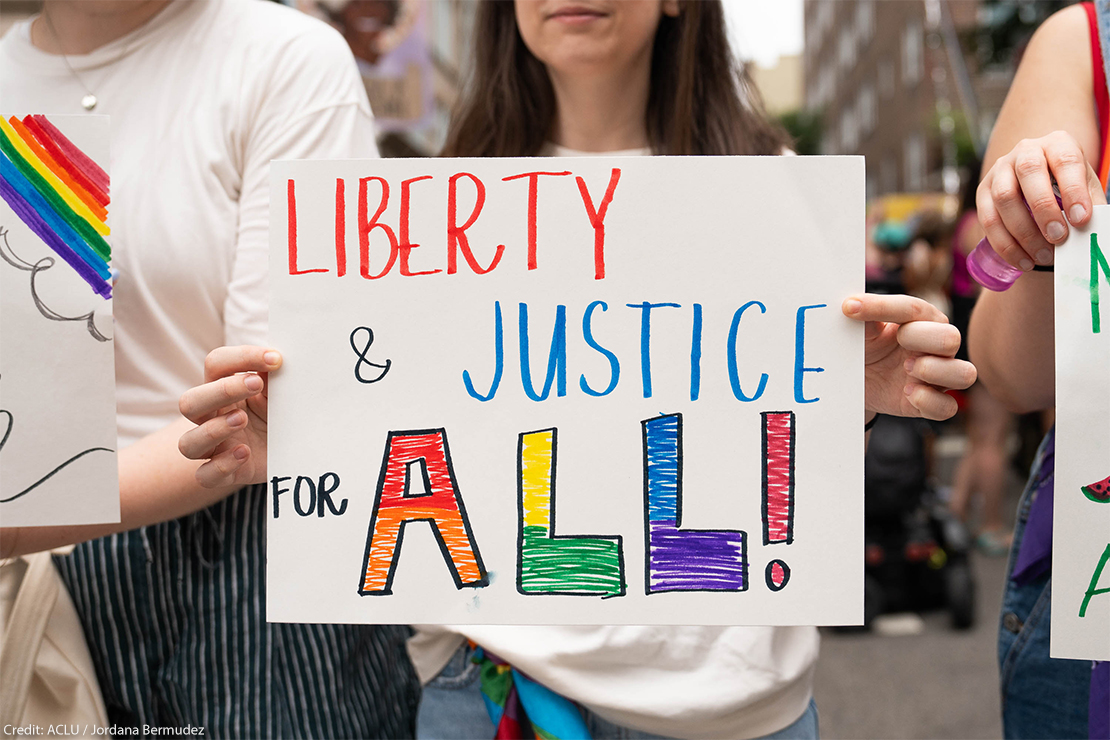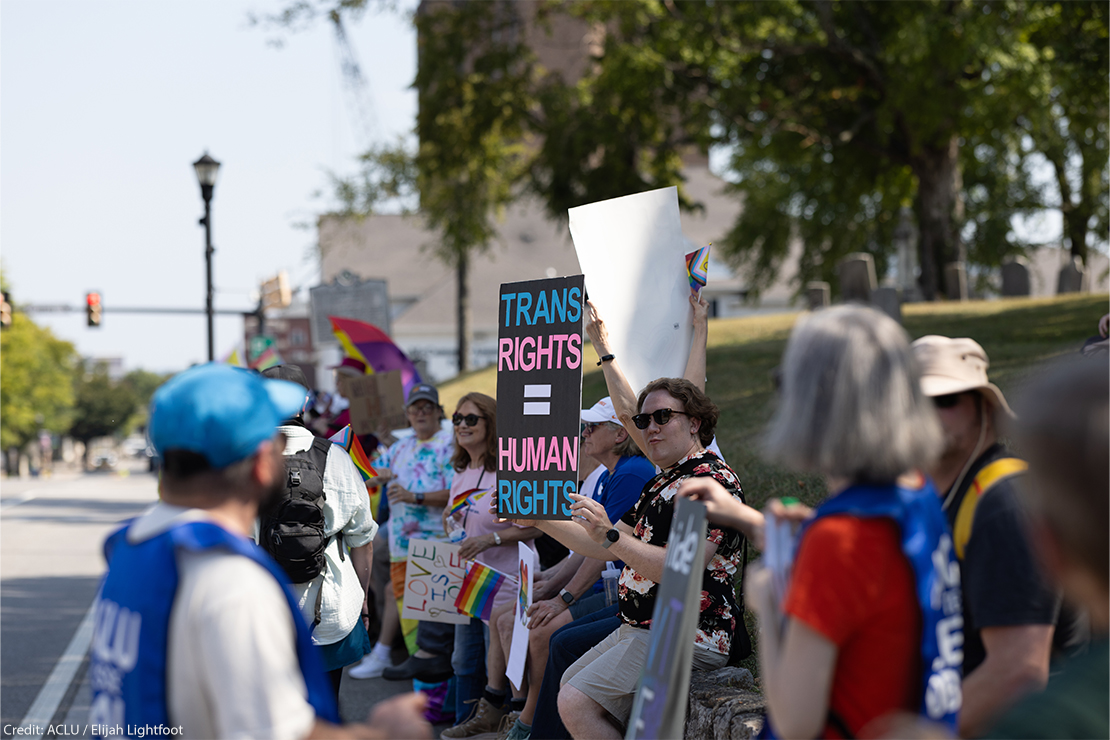
Since 2021, 24 states have banned hormone therapy for transgender youth with gender dysphoria. Leading medical experts and organizations — such as the American Medical Association, the American Psychiatric Association, and the American Academy of Pediatrics — oppose these restrictions, which have already forced thousands of families across the country to travel to maintain access to medical care or watch their child suffer without it.
In July 2023, the Sixth Circuit Court of Appeals rejected a request from families and medical providers to block a Tennessee law banning gender-affirming medical care. Some of the plaintiffs from that case — a Nashville-based couple and their transgender teenage daughter, and a medical provider who supports trans youth — joined plaintiffs challenging a ban on trans health care in Kentucky to ask the Supreme Court whether these laws are unconstitutional.

What is gender-affirming care? Your questions, answered.
This year, the Supreme Court agreed to hear the case, now listed as U.S. v. Skrmetti. The plaintiffs in the Tennessee case are represented by the American Civil Liberties Union, the ACLU of Tennessee, Lambda Legal, and Akin Gump. Our legal challenge is limited to the provisions of Tennessee’s ban targeting hormone therapies — such as hormone replacement therapy and puberty blockers — and does not implicate surgical care. To understand what’s at stake, the ACLU breaks down the case and who it impacts. We also share what we can all do to protect gender-affirming care and support trans rights.
How Could Skrmetti v. U.S. Impact Trans Health Care?
The question in this case is whether Tennessee’s law banning gender-affirming hormone therapies for transgender minors violates the Equal Protection Clause of the US Constitution. Tennessee’s ban, like every other passed by politicians in recent years, specifically permits these same hormone medications when they are provided in a way that Tennessee considers “consistent” with a person’s sex designated at birth. This means, for example, a doctor could prescribe estrogen to a cisgender teenage girl for any clinical diagnosis but could not do the same for a transgender girl diagnosed with gender dysphoria.
The ACLU argues that Tennessee’s ban is a clear example of discrimination on the basis of sex and transgender status making it a violation of the Equal Protection Clause of the 14th Amendment of the Constitution. We made a similar argument in 2020 when, alongside other legal advocates, we successfully argued in front of the Supreme Court on behalf of LGBTQ clients fired because of their sexual orientation and gender identity, including a transgender woman fired from her job at a Michigan funeral home. In a 6-3 ruling, the Supreme Court ruled in favor of LGBTQ workers and found “it is impossible to discriminate against a person for being homosexual or transgender without discriminating against that individual based on sex” and therefore discrimination against LGBTQ workers was impermissible sex discrimination under Title VII, the federal law prohibiting sex discrimination in employment.
In recent years, district courts unanimously blocked bans in Arkansas, Alabama, Florida, Georgia, Indiana, Kentucky, and Tennessee, but the Sixth, Seventh, and Eleventh Circuit Courts of Appeals have allowed these bans to take effect. The Supreme Court must now decide whether states can ban medical treatment for transgender youth with gender dysphoria, but not whether they must. If the court finds Tennessee’s law constitutional, the immediate impact on access to these treatments will be limited to the two states where the bans are already in effect.
How Does this Case Impact Other Health Care, Like Birth Control?
When arguing against transgender people and their families, states with bans like Tennessee’s have relied heavily on the Supreme Court’s opinion Dobbs v. Jackson Women’s Health Organization, which overturned Roe v. Wade and allowed states to ban abortion. U.S. v. Skrmetti will be a major test of how far the court is willing to stretch Dobbs to allow states to ban other health care. The court’s ruling could serve as a stepping stone towards further limiting access to abortion, IVF, and birth control.

How Can We Support Access to Gender-Affirming Care?
- Share Your Story: Because most people do not know a transgender person, they also have little experience with our health care and may not understand why it is so important for our lives and our freedom. If you or a family member is trans, consider sharing your experience with gender-affirming medical care on social media, with elected officials, in op-eds and blog posts, and other public forums. Consider writing to local reporters and news outlets about the case and the implications it could have for you and your family.
- Some questions that help indicate why access to gender-affirming care is important include: Why is access to hormone therapy important for you/your family? How have you been impacted by bans on this care? What do you wish more people understood about gender-affirming medical care? Most transgender people have answers to these questions, and our stories and experiences are of immeasurable value in the fight against these bans.
- Before sharing online, make sure you are protecting yourself and your family from harassment. PEN America’s Online Harassment Field Manual has some steps you can take to minimize your risks of harassment, doxxing, or other efforts to silence your story and voice.
- Support Transgender Youth: From school boards to statehouses to Congress, there are countless opportunities to advocate for the rights of transgender people and their families. Consider contacting your state ACLU affiliate, your local chapter of PFLAG, or other local and state organizations working to support LGBTQ people.
- The Campaign for Southern Equality also operates the Trans Youth Emergency Project, a nationwide initiative to help support families with transgender youth fighting to maintain access to the health care they need.
- Show Up at the Court: Arguments in Skrmetti v. U.S. have not been scheduled yet, but they are likely to be held in Washington, D.C. this December. The moment the court releases its schedule, the ACLU will let our supporters know how to join us outside the court for a rally. We need a joyful, peaceful, and loud show of support for transgender people and their families.
Comments
Post a Comment